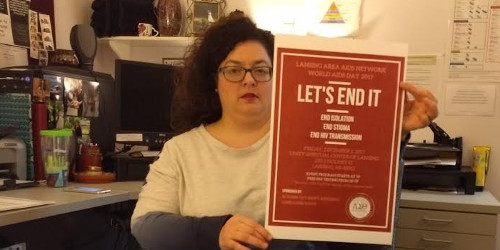
Behind her, hanging on the wall of her small office in south Lansing, are a serious of information posters. One is Maslow's Heirarchy of Needs, another is a pull from one of the HIV publications showing all the anti-HIV drugs currently approved in the U.S. This is Bambi Burnham's office at the Lansing Area AIDS Network on the city's near southside. It's an unassuming and inviting space with subdued lighting.
Burnham herself has an infectious laugh and quick sense of humor, essential tools in helping people living with HIV gain access to a daunting medical system which will ultimately assist them in staying healthy. She is part of a new cadre of HIV workers assigned to locate those who know they are living with the virus but have fallen out of care. Once that is accomplished, its her and her colleagues job to remove the obstacles to medical care and help that person control their infection. She also works with newly diagnosed persons as they navigate a medical system that can be imposing and alien at first.
"Many times, the person that I'm working with, they are least concerned about their HIV," said Burnham. "It's all of the other pieces that they need help with: stable housing, food on the table, whether they have a social network that, of family and friends that are healthy relationships for them. Approaching a client as a whole person instead of just looking at the HIV is really, I think, key to having a successful encounter."
Indeed, many people living with HIV who know they have the virus, struggled with a plethora of issues from substance abuse to domestic violence to mental health issues to unstable housing which create obstacles to attending medical appointments, accessing medical care and prescriptions and taking medications daily. Studies have found that without addressing these issues, connecting a person to care will fail.
And failure to connect a person to care could have deadly consequences for the person with HIV and prove a risk to public health. Michigan has joined the CDC and other public health leaders to push the news that science has found that a person who is living with HIV who is on successful treatment with anti-HIV medications not only lives a longer, healthier life; but also cannot sexually transmit their infection to partners, the main mode of transmission of HIV in the U.S.
"If you can gain their trust and remove the barriers and keep them in long-term care, that's going to help end the epidemic because they will not be infectious," said Burnham.
State health officials agree. That's why they are funding EIS workers across the state.
"EIS is really the gold standard of helping people navigate that first period of getting back into care or being newly impacted," said Katie Macomber, director of the Michigan Department of Health and Human Services HIV/STD Programs.
Macomber referred BTL to Burnham because of her experience in the programming. Burnham has become a trainer for other EIS workers across the state. These two year old positions compliment and support the ongoing work of traditional caseworkers at AIDS Services Organizations, or ASOs. And even those roles have changed, noted Macomber. Those have shifted into one on one counseling services and coaching and away from end-of-life preparation and group facilitation work traditionally funded by the state.
Despite the public health impacts, Burnham said her focus is on the well being of the individual when she is working with them.
"When I'm working with someone, I try not to give them the message that this is good for the community, because really everybody is typically interested in what's good for me," she said.
And removing and addressing those barriers can range from spending 16 hours in the hospital with a client to make sure they are getting the necessary medical interventions to live. It can mean navigating through the complicated process of obtaining insurance through the health care exchanges. Sometimes, it requires creative solutions to reach those who are not in care to cajol them back.
"If I can't reach a client in a typical way through phone or text, I have send holiday cards that are non-disclosing, so they don't know that it's coming from an agency," she said. "My point is to show up for that person, that somebody really does care about them as a person, and I've had really good success stepping out of the office mode to try and make sure people are taken care of."
From the Frontlines: Early Intervention Services










